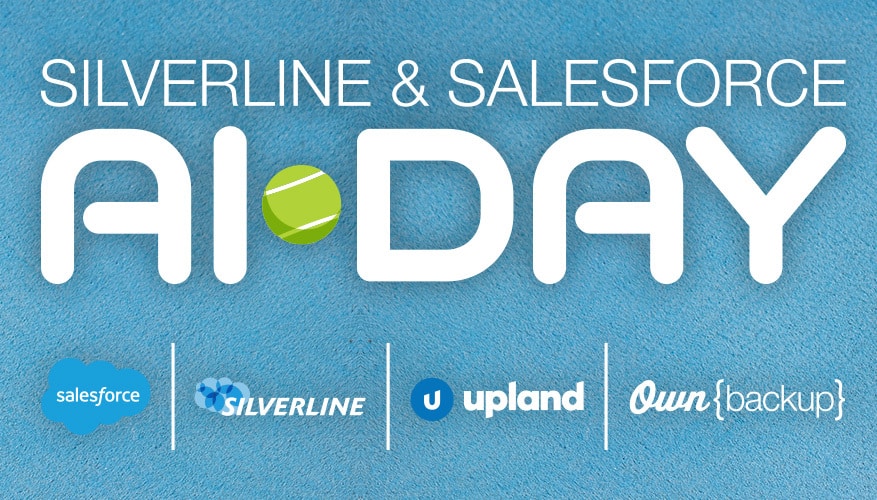Reading Time: 5 minutes
On August 29, Silverline and Salesforce welcomed over 40 leaders from across the financial services industry for AI Day. The exclusive invitation-only event explored the vision for the future of trusted enterprise AI. AI Day was held at the Salesforce Tower in New York City, followed by a fun evening at the matches of the US Open in Queens.
The informative and insightful event featured expert panelists discussing AI strategy and policy, emerging use cases for AI, and Salesforce’s roadmap. Here we share the highlights and key takeaways from AI Day.
Kicking off with a generative AI keynote
AI Day began with a volunteer session for the movement to end ALS with Valerie Estess, Director of Research at Project ALS. Salesforce is on a mission to raise awareness and funds for ALS treatment, inspired by and in honor of our colleague and friend, Brooke Eby, Principal, Partnerships at Salesforce.
Ryan Radding, SVP at Salesforce, provided the opening remarks, and Susan Emerson, SVP – Product: AI, Analytics & Data, at Salesforce, kicked us off with The Transformative Power of Generative AI Keynote. Emerson spoke about how we should think about generative AI as it relates to opportunity, trends, and trust, and Salesforce’s AI approach to product, strategy, and vision.
Generative AI is changing every industry, impacting everything from business models, competition, revenue streams, productivity, product innovation, employees, customer experience, and risk. Some business models are getting a power boost of transformation, and others are getting disrupted faster than they can react.
But the rate of change will never be as slow as it is today – ChatGPT is the fastest-growing consumer app in history. This time is different because of impact, disruption, speed, and wide consumer access.
Emerson challenged attendees to think about how we can innovate and leverage the benefits of generative AI while maintaining trust. She spoke about how Salesforce pioneered AI for CRM with Salesforce Einstein, its native AI baked into every product. Now, it delivers more than a trillion weekly predictions to Salesforce customers.
“We knew nearly a decade ago that AI would change everything, so we went all in. We’ve invested in our in-house AI research, and to date have 227 AI research papers published and 250 AI patents,” said Emerson. “But now we are unlocking a new platform for growth. Because it’s a new day with generative AI. And because of our near decade of leadership, we are poised to meet the moment with our customers.
But despite the excitement and incredible potential of generative AI, there are also concerns. Salesforce polled over 500 senior IT leaders and found:
- 67% believe generative AI is a business priority and plan to fast-track its adoption over the next 18 months
- That said, almost all of those leaders also believe that implementing AI will require significant preparation to address challenges
- 83% say they would collaborate with other businesses to improve ethical use
Companies are worried about their data being misused and not being secure. There are concerns specific to the outputs of generative AI, such as providing biased results as a result of incomplete or unreliable data. Large language models that power generative AI tools must be grounded in the right data and be trained to generate improved outputs over time.
Salesforce AI Cloud delivers productivity for every workflow, user, and department. Salesforce is bringing generative AI to every cloud and addressing key operational pain points and opportunities. For example, Sales GPT automates prospecting emails so sellers can spend more time with customers. According to the Salesforce State of Sales report, reps are currently spending ~2.5 hours on emails, and SalesGPT can auto-create personal and impactful emails to accelerate this process.
Emerson also announced the pilot for Prompt Studio coming soon. Prompt Studio allows users to create, test, and manage AI prompts, ground prompts with CRM and Data Cloud data, and put AI into action across the Customer 360.
Data Cloud establishes a data foundation for AI
Jake Koeneman, Alex Thompson, and Priyanka Tandon from Salesforce presented a session about establishing a data foundation for AI using Salesforce Data Cloud. Data Cloud unlocks 360 financial data such as transaction, behavioral, and consent data and turns those signals into action. The speakers walked attendees through how Data Cloud works:
- Connect: Data from all sources is brought together, including support for several out-of-the-box connectors such as Salesforce, Snowflake, Google Cloud Platform, streaming data from web and mobile sources, and APIs integrated with MuleSoft
- Harmonize: Data is ingested and transformed in streaming or batches with clicks, not code
- Unify: Data is unified to bring identities together to create a true 360 view of each customer
- Analyze and predict: The user has real-time unified profiles that can be used with any AI or BI tool for predictive insights, recommendations, and data discovery
- Act: Power decisioning, real-time applications, analytics, and more, all on the Salesforce platform to save time and create personalized customer experiences
But with multiple data sources, Data Cloud must provide a common model to drive business insights. This is where mapping disparate data source structures to a canonical model is essential.
The speakers addressed how Data Cloud takes siloed data schemas and maps them to a common model, allowing for the ingestion of disparate schemas at scale. Different source data have differing source schemas. So, to simplify data unification and machine learning, it must be able to operate on one common model to allow for data lakehouses, like Data Cloud, to scale.
Data mapping is performed in Data Cloud visually and through metadata. The user interface provides the ability to drag source columns to the corresponding destination column in the canonical data model. This allows the user to map Data Model Objects to Data Lake Objects.
Silverline recently announced a comprehensive suite of Salesforce Data Cloud implementation packages designed to empower companies to leverage the full potential of their data assets. The packages include expert advisory, implementation strategy, and best practices to ensure seamless integration and maximize return on investment.
At Dreamforce ’23, Salesforce announced that Data Cloud is now available to all Enterprise and Unlimited licensed clients, offering access to Data Cloud technology with a consumption-based pricing model. This announcement aligns perfectly with Silverline’s commitment to delivering tailored solutions that evolve with the industry.
Technology showcase illustrates AI in action
After a panel featuring perspectives on AI from industry leaders at organizations like Snowflake, Alloy, Slack, Old National Bank, and Teachers Federal Credit Union, AI Day concluded with an AI C360 technology showcase by Peter O’Connell and Erich Picchietti from Salesforce.
They spoke about how Einstein Gen AI extends what Salesforce is already doing through predictive AI and taking that data-powered AI one step further to generate content that enables the user to act on the precision that predictive AI grants. They told attendees to think about AI as a continuum, and that generative AI is not about making predictions but creating new things. For example, predictive AI can help the user score a lead and make a prediction on how likely the lead is to close based on previous data. Generative AI can auto-craft an email to convert that lead and move it down the funnel. Working in tandem is where users get the true power of AI.
O’Connell and Picchietti shared how Salesforce sees Einstein AI architecture evolving. From the bottom up, Salesforce is building natively on harmonized, real-time data in Data Cloud. This brings together not just a user’s transactional CRM data but also their dynamic engagement data, such as the clicks on a website or the email opens, all of which are signals that can ground AI prompts.
They presented the example of a financial transaction dispute. Transaction disputes cost the top 15 U.S. banks up to $3B per year. How an employee handles the interaction can have an outsized impact on the customer relationship. A contact center agent needs to be able to access insights like Churn Prediction and Banking Sentiment to proactively contact a customer, give them a personalized case update, and stoke a little goodwill with an offer.
By harnessing the data, the agent can access the full spectrum of AI across predictive for Churn Predictions, natural language processing for feedback Management Sentiment Analysis, generative for Transaction Dispute Advisor, and machine learning for Financial Services Product Recommendations. Every insight and action needed to understand the customer is available and the agent can take steps to improve the relationship in an industry-specific workflow.
Find out how Silverline’s Financial Services team can help your organization with AI and Data Cloud.



